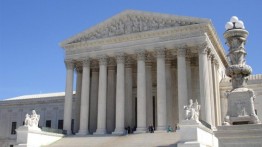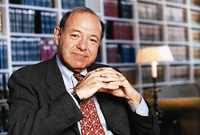The Man Who Takes It All the Way Up to the Supreme Court

Professor Burt Neuborne, one of this country’s top civil rights lawyers and a man with a reputation as the defender of lost causes, comes to Cooper Union starting on Thursday October 4 at 6:30 PM to deliver a free, public series of lectures titled “Three Constitutions: Republican, Democratic and Consensus.” (The school requests registration for the ten-part, weekly series.) We had a chance to chat with Prof. Neuborne prior to his first appearance at the Great Hall. He talked about the childhood event that shaped his passion for civil rights, why the Supreme Court’s recent health care bill decision did not surprise him, and Cooper Union’s role in shaping the Constitution.
 Born in the Bronx, but raised in Greenpoint, Brooklyn, Prof. Neuborne, 72, now lives a stone’s throw away from Cooper Union and teaches civil liberties law at New York University. He earned his national reputation arguing cases before the Supreme Court that include the legality of the Vietnam War, defending the right to alter the Stars and Stripes as an act of free speech and, more recently, in support of the McCain-Feingold campaign finance reforms. But his name became internationally famous when, as the lead councel for surviving Holocaust victims, he reached a $1.25 billion settlement with Swiss banks for money they withheld since the Second World War.
Born in the Bronx, but raised in Greenpoint, Brooklyn, Prof. Neuborne, 72, now lives a stone’s throw away from Cooper Union and teaches civil liberties law at New York University. He earned his national reputation arguing cases before the Supreme Court that include the legality of the Vietnam War, defending the right to alter the Stars and Stripes as an act of free speech and, more recently, in support of the McCain-Feingold campaign finance reforms. But his name became internationally famous when, as the lead councel for surviving Holocaust victims, he reached a $1.25 billion settlement with Swiss banks for money they withheld since the Second World War.
What got you interested in civil liberties?
There is a story I tell. My dad was a great war hero during World War Two. He was a “frogman” and one of the first people on Omaha beach, blowing up obstacles so the ships could come in. Later he marched into Paris with Patton. He was a highly decorated guy. So I was a kid in Brooklyn following his progress on a map with pins. And I would write to him and he would write to me. One of the things we would write about was baseball. It was a shared passion. He would write that when he got home we would go to a game together. So that became my idée fixe: that he would come back and would take me to a baseball game. So sure enough he comes back in 1946 and I oil my mitt and get ready for the big day. But nothing happens. He doesn’t take me. I am thinking to myself, “I must be this huge disappointment.” But I keep waiting. June passes. July passes. Finally in early September I break down at dinner and begin to cry. He asks me, “What’s the matter?” And I said, “Why won’t you take me to a baseball game? Are you so ashamed of me?” His face goes dead white. Every bit of color drains out of his face. He says, “We have to take a walk.” So we go out and he says, “I’m not disappointed in you. But we can’t go to a baseball game yet. They don’t let black people play and we don’t support things like that.” It was like an explosion that went off in my head and in my heart. But my father being my father, he then said, “But that shouldn’t prevent you from seeing a baseball game.” So that Sunday we went to Newark to watch the Negro League and it was phenomenal. I learned more constitutional law in that week than in my whole life.
Can you tell us about the lectures you will be giving at Cooper?
I want to try to take area after area of the law and explain how the Supreme Court is really deciding the cases. In other words, what’s pressing them; what’s moving them back and forth. If you listen to the lawyers what you will get is a steady stream of statements saying, “all the judges do is apply the law. They don’t make it. This is not politics. This is law. There is a great difference between the two.” I want to explode that myth. I am going to argue that when it comes to complicated, hard, new constitutional issues that have not been decided before and where the text is ambiguous, the Supreme Court Justices should and do use their value hierarchy to break constitutional ties. And I am going to argue over the series that I can relate that to Democrats and Republicans. That there is a Democratic Constitution, a Republican Constitution and a consensus Constitution that everybody agrees upon. I am going to try and tease that out in cases about democracy, free speech, religious freedom, the right to bear arms and others.
Who is the audience for this series?
I conceive of the lectures as being for non-lawyers. They are for the general public and not like a law school course where we worry about the picayune ins and outs of things.
What made you choose this subject for the series?
The reason I was pleased to accept Cooper Union’s invitation to do this, is because I believe that each Presidential election is a rolling constitutional convention, where the people will elect a president who will then populate the court with Justices that have the same values as he does. So over time the people will get the constitution they want by electing the president who will put into power the Justices who will bring them that constitution. And there is a real choice between the Democratic and Republican constitution. They are both wonderful documents. But they are different documents. And the people choose which of those documents they want when they choose a president.
How does the current presidential election stack up in importance with ones past?
The last election that was this important was the election of 1936, where the reelection of Roosevelt cemented the Democratic majority on the Supreme Court so that there was a Democratic Constitution from 1936 to 1972. The Democrats lost control of the Supreme Court in 1972 and there has been a Republican Constitution ever since. And we are on the verge now, given the age of the Justices and how closely balanced it is, that probably the next two presidential elections will determine the make-up of the court for the next 50 years in terms of whether it is a Republican Constitution or a Democratic Constitution that will govern us in the 21st Century.
What are the most important Supreme Court constitutional decisions of the last ten years?
There are two that I press very strongly: Bush v. Gore in 2000 where the Court actually gave the election to Bush by preventing Florida from completing the recount. And the second most important would be Citizen’s United where they allowed corporations to pour unlimited amounts of money into the political process.
How do those decisions factor into the thesis of your lecture series?
They are both 5-4 decisions along party lines and they are classic examples of the Republican and Democratic Constitutions in practice. Now I make no secret of the fact that I am a liberal but I am going to say that both decisions are correct from a technical standpoint. It isn’t that the Supreme Court made a terrible mistake in Bush v. Gore or Citizens United, it’s just that they acted unwisely. While both opinions are technically correct, what the opinions vary on is the relative importance of primary values. The Democrat-appointed judges pay much more attention to equality, to popular sovereignty and the need to take risks to run a vigorous democracy. The Republican-appointed judges pay much more attention to autonomy and the ability of the individual to act without the government doing anything to them even when the government is trying to foster equality. They are also risk averse. For example in the case of requiring voter ID cards the Democrats are saying: we’ll take a moderate risk that there could be some voting fraud in return for a payoff of having more people vote. The Republican position is that if there is any risk at all of voter fraud then we will uphold the bill and less people will vote. And so the people need to understand this Democrat / Republican division of approach to democracy and therefore choose the kind of president that will populate the court with those core kind of values.
Did the recent health care decision surprise you?
The outcome did not surprise me but the rationale did. I was pretty confident that the government could regulate the health care market because it is a unique market that none of us can opt out of the way we can opt of the auto market or the gym market. At some point you are going to get sick and at some point, whether you want to or not, you are going to need those services. It seemed to me that once there is such a unique market then government has to regulate that market both negatively, by saying you are not allowed to certain things, and positively by saying you must do things, like buy insurance, if that is necessary for the efficient regulation of the market. So I thought the Justices would uphold positive regulation. That argument lost 5-4, which surprised me. But the bigger surprise was that Chief Justice Roberts then back-doored and decided this is not a commerce case, this a tax case. He was the only Justice that felt that way. Roberts wins that case one to eight [laughs.]
Is Roberts’ decision in keeping with the notion of a Republican Constitution?
Roberts gave the right-wing the two issues they really cared about: a decision that said congress can’t use affirmative regulation under the commerce clause and the decision that Congress can’t blackmail the states into participating by threatening to take the rest of their Medicaid funds away. So Roberts gave the right what they wanted ideologically and gave the left what they wanted in terms of outcome. Now if he had gone the other way I would be not be talking about a Democratic and Republican Constitution determined by different core values. Instead I would be talking about a Democratic and Republican Constitution and that the Justices are voting like partisan politicians. And that is a distinction I am going to make in the lectures. It is one thing to make a decision that advances the electoral advantages of the Republican Party or simply buys into their program. It’s another thing to say we all have these shared values and, in cases where we can’t make them all work at the same time, we have to figure out which one has preference. And I think that is a perfectly valid thing.
Is there a historical connection between Cooper Union and the shape of the Constitution?
Lincoln’s first great address on slavery was in the Great Hall. That statement about slavery was, after a bloody civil war, eventually embodied in the 13th, 14th and 15th amendments. It was the kernel of the equality provisions of the constitution. It may be one of the single most important speeches ever given in American political history.
Professor Burt Neuborne’s free lecture series begins Thursday, October 4 at 6:30 PM in the Great Hall. You can register for it here.




